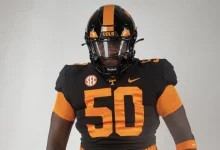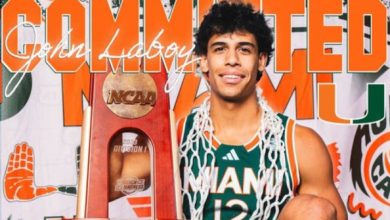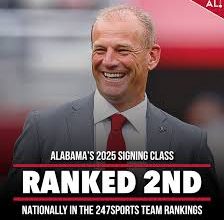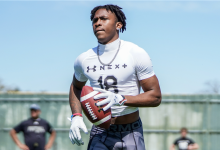Former Texas A&M standout Shemar Stewart misses first NFL practice over unsigned contract
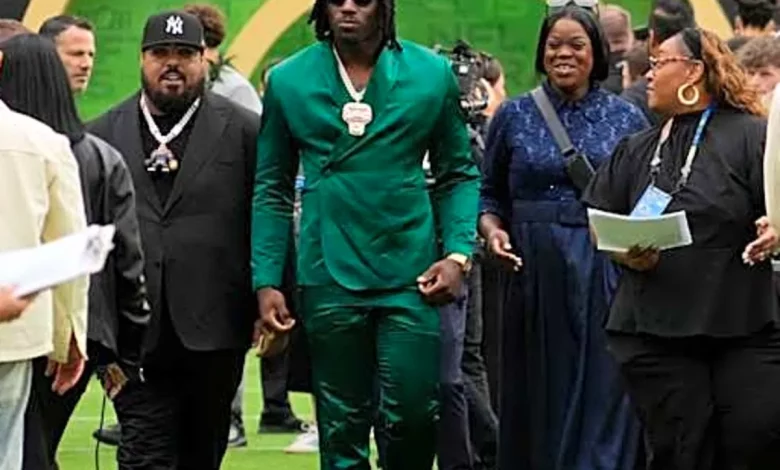
Former Texas A&M standout Shemar Stewart, one of the most highly touted defensive prospects in recent memory, has made headlines once again. However, this time, it’s not for his on-field accomplishments but rather his off-field contract negotiations. Stewart, who was drafted in the 2025 NFL Draft, missed his first official NFL practice after failing to sign his rookie contract in time for the start of team activities. This development has raised questions about his future with the team, the dynamics of rookie contracts in the modern NFL, and what it means for both Stewart’s career and his team’s expectations for the upcoming season.
As a player who stood out in the SEC for Texas A&M, Stewart’s path to the NFL was always expected to be one of high expectations. His absence from practice, even if brief, is a significant story that is bound to spark debate among fans, analysts, and coaches. In this article, we will explore the situation in detail, looking at the significance of Shemar Stewart’s contract negotiations, what missing an NFL practice means for a rookie, and how this situation could affect both his future and the NFL landscape at large.
Shemar Stewart’s Rise to Prominence at Texas A&M
Before we dive into the contract situation, it’s essential to understand why Shemar Stewart has become such a highly regarded figure in the world of football. The 6-foot-5, 315-pound defensive lineman played for Texas A&M in the SEC, one of the most competitive conferences in college football. Stewart quickly established himself as one of the most disruptive forces in the league, combining raw power with quickness and elite football IQ.
During his time at Texas A&M, Stewart became a staple of their defensive front, consistently drawing the attention of scouts and coaches across the nation. His size and athleticism made him a nightmare for opposing offensive lines, and his ability to both rush the passer and stop the run made him a versatile weapon for the Aggies. He was named to multiple All-SEC teams and received numerous accolades, cementing his reputation as one of the top defensive players in the country.
By the time the 2025 NFL Draft rolled around, Stewart was considered one of the top defensive line prospects in the nation. His skills were viewed as NFL-ready, and his projection to be a high draft pick was all but assured. With that kind of pedigree, it was no surprise when he was selected early in the draft. He was poised to make an immediate impact on whichever team chose him, and expectations were high.
The Business Side: Contract Negotiations and Holdouts
In the NFL, the process of a rookie signing a contract is often less straightforward than it may appear, and for high-profile players like Shemar Stewart, the financial stakes are incredibly high. Rookie contracts, though generally fixed in structure due to the NFL’s collective bargaining agreement, can sometimes become a point of contention. Disputes over signing bonuses, guaranteed money, and contract language can delay a deal, and it is not uncommon for rookies to miss part of training camp or practices as a result.
For a player like Stewart, who is expected to contribute immediately to his team’s defense, any missed time is particularly frustrating. However, his absence from his first NFL practice due to an unsigned contract points to the delicate balance that rookies must strike between securing their future earnings and adhering to the team’s timeline for preparation. A holdout, even a short one, can often lead to tension between the player, his agent, and the team’s front office.
The timing of the contract situation is especially crucial for Stewart, as rookie minicamps and organized team activities (OTAs) are vital for new players to get acclimated to the professional environment. Missing out on these early training sessions can put him at a disadvantage, as he’ll have less time to integrate into the system, build chemistry with his new teammates, and prove himself in front of his coaches.
The Effect of Missing Practice on a Rookie
For a rookie player, missing even a single practice can be detrimental, especially when the player in question is expected to be an immediate contributor. The first few practices of an NFL offseason program are critical for a player to learn the playbook, adjust to the speed of the game, and begin building relationships with teammates. These practices also allow the coaching staff to assess the player’s readiness and potential impact on the team.
The NFL is a league where competition is fierce, and rookies are constantly vying for playing time. A player like Stewart, who has a lot to prove and a lot of expectations on his shoulders, needs every opportunity he can get to show his worth. Missing practice can also affect a player’s chances of starting during the regular season, as coaches will naturally gravitate toward players who have spent the most time on the field during the offseason program.
Moreover, rookies often find themselves in a race against time to earn the trust of their coaches. This is especially true for players who are projected to start in their first year. Any missed practice or delay in signing a contract could cause doubts in the coaching staff’s mind about the player’s commitment or readiness. If a player is absent during key development periods, coaches may begin to consider other options or give priority to veteran players who have been with the team longer.
For Stewart, missing that first practice means he’s playing catch-up with the other rookies on the roster. While it’s unlikely that a single missed practice will prevent him from becoming a key player, it certainly doesn’t help his cause.
What Missing an NFL Practice Means for Shemar Stewart’s Future
Shemar Stewart’s future in the NFL is certainly not defined by a single missed practice, but it does raise some important questions. For one, it serves as a reminder that the business side of football can sometimes complicate a player’s path to success. It’s easy to focus on the physical aspects of the game—speed, strength, technique—but the contractual aspects of being a professional athlete are just as important.
This situation might serve as a wake-up call for Stewart, highlighting the need for him to balance his on-field responsibilities with his off-field obligations. NFL rookies quickly learn that time is precious, and every moment of practice is an opportunity to improve. If Stewart’s holdout extends longer than expected, he may risk falling behind in his development.
Furthermore, Stewart’s situation could have long-term ramifications for his relationship with the team’s front office and coaching staff. If the holdout persists or if contract negotiations become contentious, the team may begin to question whether Stewart is truly committed to his career or simply focused on securing the best financial deal. In the NFL, where careers are often short-lived and players must constantly prove themselves, any sign of discord or lack of focus can jeopardize a player’s standing with the team.
On the other hand, if Stewart and his representatives manage to finalize a deal quickly, it’s likely that he will be back on the field in no time. Assuming there are no further delays, Stewart’s missed practice will become nothing more than a brief hiccup in what should be a promising career.
The Bigger Picture: Rookie Contracts and the NFL’s Changing Landscape
While Stewart’s situation is undoubtedly important for his personal career, it also underscores a larger issue in the NFL. Rookie contracts, once structured in a way that all but guaranteed a player would sign, have become more complicated with the rise of high-value NIL deals and the increasing importance of agent representation. Players like Stewart, who are highly sought after, often have leverage when it comes to negotiating their rookie deals.
The NFL has seen a shift in recent years with younger players entering the league more financially savvy, and teams are now faced with having to balance compensation with the need to develop long-term talent. Rookie contracts, while standardized to some extent, still vary based on negotiation factors like signing bonuses, guarantees, and performance incentives. These details, though seemingly minor, can delay the process and cause players like Stewart to miss important time on the field.
In many ways, the situation reflects the broader challenges facing both players and teams in the modern era of professional football. With more financial incentives, public attention, and agent involvement than ever before, the process of transitioning from college to the pros has become more complicated. It’s not just about signing a contract anymore; it’s about navigating the complex web of financial deals, media exposure, and franchise expectations.
A Bump in the Road, Not a Deal-Breaker
Shemar Stewart’s absence from his first NFL practice due to an unsigned contract is certainly a noteworthy event, but it is by no means a career-defining moment. It’s a reminder of the business side of football and the importance of balancing off-field negotiations with on-field performance. While missing practice is never ideal, especially for a rookie trying to make a strong impression, Stewart’s talent and potential are undeniable.
Ultimately, this situation will likely resolve itself in the coming days, with Stewart signing his rookie contract and returning to the practice field. However, it’s also an important lesson for Stewart and for the NFL as a whole about the delicate balance between a player’s career aspirations and the realities of professional football contracts. For now, it’s just a bump in the road, but it’s one that will be remembered as part of Shemar Stewart’s journey to the NFL.

